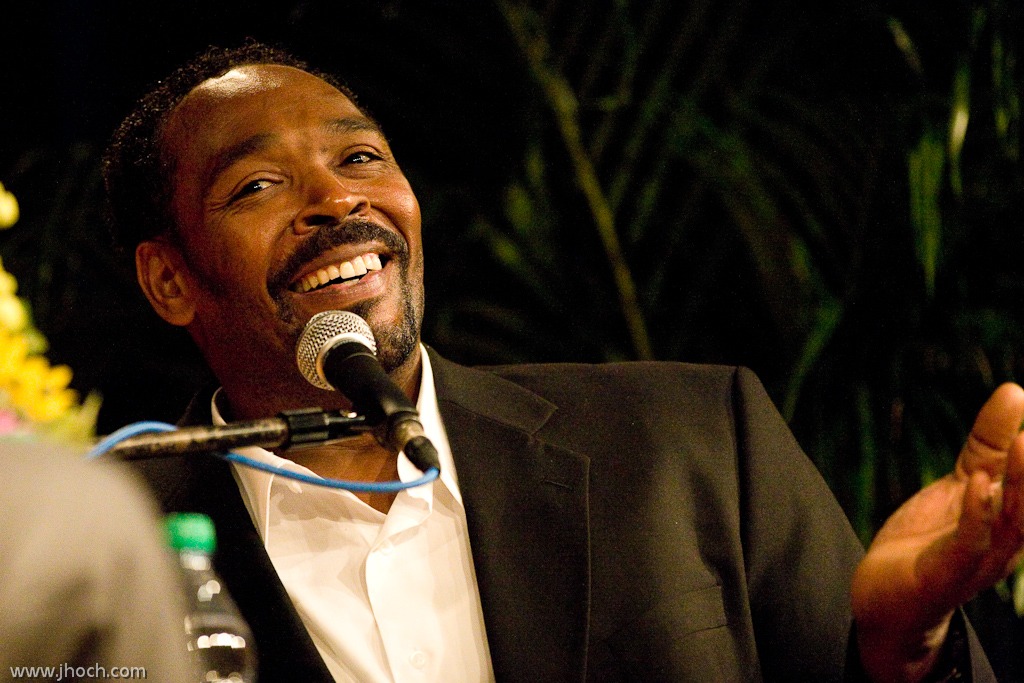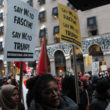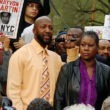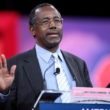Photo Credit: Justin Hoch
March 3 will mark the 25th anniversary of the videotaped beating of Rodney King in South Central Los Angeles—an event that history may regard as the unofficial commencement of what we now call the Black Lives Matter movement. The video surprised many white Americans, but very few African-Americans. (Seventeen years earlier, comedian Richard Pryor had lamented police brutality and the refusal of many white Americans to accept the reality of anti-black aggression in law enforcement.) The acquittal of the four white officers who nearly killed Rodney King precipitated the notorious Los Angeles riots—and the still unresolved conflict between law enforcement and communities of color.
In August, representatives of the Black Lives Matter movement released Campaign Zero—a 10-point plan to dismantle the culture of police brutality. Among the campaign’s demands are: an end to the “broken windows” police practices that fixate on minor offenses (i.e., the philosophy that killed Eric Garner); strengthening community oversight over law enforcement; elimination of high-speed chases and false justifications to use force; expansion of independent investigations and prosecutions of police brutality; implementation of policies to diversify an overwhelmingly white male police force; expansion of the use of body cameras and the elimination of laws that discourage videotaping of police by private citizens; and the improvement of police training (with a focus on an anti-bias program).
It’s hard to see how Campaign Zero’s proposals would not pass a common-sense test; whether they will be implemented on a wide scale is another matter. For example, diversifying big-city police departments might require the elimination of irrelevant written exams for candidates—especially when those exams have been exposed as exclusionary. As for the public filming of misbehaving cops, two federal appellate courts have recognized that right, but the Supreme Court has yet to rule—and, depending on the outcome of the 2016 presidential election and the judges the next president appoints to the High Court, may never do so.
In fact, it’s hard to see how any of these reforms would be implemented broadly without a voter-mobilization effort aimed at communities of color. Remember the stories of unusually low African-American voter turnout in Ferguson, Missouri, which may have led to the lack of police accountability there? A recent increase in African-American voter turnout in Ferguson is beginning to deliver much-needed reforms.
Only by pushing for increased voter turnout in communities of color and ensuring that unverifiable voting systems are retired can the goals of Black Lives Matter and Campaign Zero become reality.
Such reforms won’t happen if African-Americans are victimized by voter-suppression. To that end, Black Lives Matter and Campaign Zero must also call for the elimination of unverifiable touch-screen voting systems nationwide, returning to the gold standard of determining who has won and lost an election: the monitored hand-counting of paper ballots. Electing candidates willing to rein in lawless cops is literally a life-or-death matter for communities of color.
Campaign Zero and Black Lives Matter must also place greater emphasis on restoring voting rights to rehabilitated felons. As Brent Staples of The New York Times observed, laws preventing convicted felons from voting were intended 8 to sabotage voting rights of African-Americans. In his famous “The Ballot or the Bullet” speech, Malcolm X explained why reactionary whites fear black voting power:
[W]hen white people are evenly divided, and black people have a bloc of votes of their own, it is left up to [black people] to determine who’s going to sit in the White House and who’s going to be in the dog house. What more efficient way to reduce black voting power than by a) over-policing black communities, b) killing young black men before and during their early voting years, c) locking up the black men you haven’t killed, and d) preventing them from voting after they are released from prison?
Only by pushing for increased voter turnout in communities of color in every election and ensuring that unverifiable voting systems are retired can the goals of Black Lives Matter and Campaign Zero become reality. Mayors and district attorneys who realize that tolerating police violence would mean the abrupt end of their political careers will become more forceful about removing racist rookies and vicious veterans from the force, and reforming police hiring so that borderline—not to mention over-the-borderline—sociopaths aren’t given bullets and badges.
As The Washington Post recently observed, the power of the vote is ultimately the only force that can reduce police racism:
Elected officials have also taken note of the changing mood. New York City Mayor Bill de Blasio (D) was elected in 2013, in part for his promise to end ‘stop and frisk’ tactics. New York Gov. Andrew Cuomo (D) earlier this year signed an executive order requiring special prosecutors to review the cases of any deaths at the hands of police officers. And California Attorney General Kamala Harris (D) has published a searchable database of a decade’s worth of police-shooting data.
It’s simply not enough to declare that black lives matter; black votes must matter, too.
Another Country: Black Students on White Campuses
The student-led Black Liberation Collective includes organizations at 86 North American colleges and universities. Its website describes African-American organizing on campuses as “a realm that has been left uncoordinated at the national level since SNCC [the Student Nonviolent Coordinating Committee] and the Black Student Leadership Network in the ’90s.”
The BLC has published a list of demands submitted by its 86-campus collective (a 56,000-word document):
These demands listed represent collective efforts by Black students to address widespread institutional inequity. These student-led efforts are crucial to addressing larger systemic issues and serve as a catalyst to dismantle institutions that promote and engage in anti-Blackness.
Three “National Demands” precede college and university lists.
1) WE DEMAND at the minimum, Black students and Black Faculty be reflected by the national percentage of Black folk in the country
2) WE DEMAND free tuition for Black and indigenous students
3) WE DEMAND a divestment from prisons and an investment in communities
Number 1 is repeated in each of the 86 college and uni- versity lists. Number 2 builds on the argument that Atlantic national correspondent and MacArthur Fellow Ta-Nehisi Coates advanced that African-Americans were a source of uncompensated labor that built the nation, and after emancipation were denied employment, lines of credit, and housing.
Some demands are particularly specific.
We demand the University System of Georgia Board of Regents establishes Interim president Jean Bartels as President of Georgia Southern University. (Georgia Southern University)
We demand the immediate removal of Tim Wolfe as [University of Missouri] system president. Wolfe resigned in November 2015 after the UM football team joined student protests. (University of Missouri)
Most of the demands are more general, addressing curriculum or university policy.
We demand all students should take a general education race, ethnicity, and racism course. (Harvard)
We demand that The Johns Hopkins University creates and enforces mandatory cultural competency in the form of a semester long class requirement for undergraduate students as well as training for faculty and administration. (Johns Hopkins University)
We demand that the College create a strategic 10-year plan that will increase retention rates for brown and black students and offer more courses and trainings that emphasize the lived experience of poor black and brown people. (Sarah Lawrence College)
We demand a practicing professional civil rights lawyer to represent students of color. This lawyer will be paid by the college to inform students of their rights with no financial burden to students or student activity fees. (Simmons College)
Other demands pertain to extra-curricular organizations or address egregious conduct on campus:
Mandatory allocation quotas for clubs (e.g. Black Student Union), departments (e.g. the department of Social and Cultural Analysis), and programs (e.g. AAP) for Students of Color, LGBTQ, and groups otherwise included within Black & Brown Coalition from the Univer- sity in the form of significant lump sum budgets to demonstrate true commitment and prioritization of students of color, queer students, and other marginalized communities on campus. (NYU)
When student leaders on campus held an Africa party, where they dressed up in a minstrel-like manner as racist African caricatures, nothing was done to correct that behavior. When “Big Ugly Niggers” was written on a chalkboard in the common lounge of a residence hall, nothing was done to correct this behavior. When students had a party at their house titled “The Jungle” and were all dressed in Dashikis, nothing was done to correct this behavior. When a student said the word “nigger” on a campus bus on the way to homecoming, and was reported, nothing was done to correct this behavior. (John Carroll University)
Easily accessible and organized by college and university, the BLC Campus Demands are a remarkable window into minority student life in American institutions of higher learning.
D.R. Tucker is a Massachusetts-based freelance writer and contributor to The Washington Monthly blog.







0 Comments